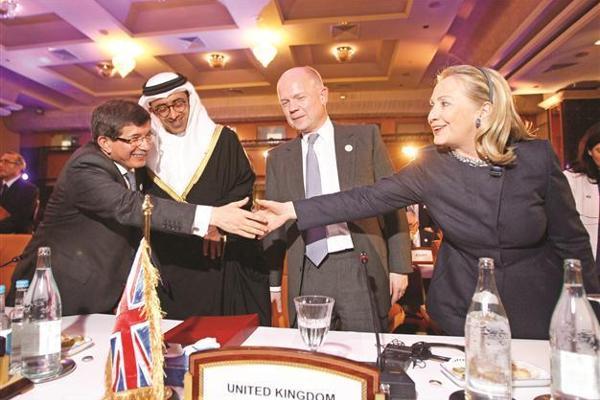Syria summit urges humanitarian action
TUNIS


US Secretary of State Clinton (R) meets with (L-R) Turkey’s FM Davutoğlu, United Arab Emirates’ FM Sheikh Abdullah bin Zayed al-Nahyan and British FM Hague. Turkish journalists (inset) protest the killings of their colleagues in the Syrian government’s violence. Reuters photo
Western and Arab nations called on Damascus to allow humanitarian aid to be delivered to Syrian civilians while also recognizing the Syrian National Council as a legitimate representative of the Syrian people during Feb. 24’s “Friends of Syria” meeting in Tunis.More than 60 nations and international institutions gathered in Tunisia for the first at “Friends of Syria” conference. Russia and China, which vetoed U.N. Security Council resolutions against Syrian President Bashar al-Assad, both refused to attend.
An updated draft declaration from the meeting called on the Syrian regime to “immediately cease all violence” and allow the United Nations to provide humanitarian access to Syria for civilians affected by the violence, a diplomat told the Hürriyet Daily News.
The draft declaration, which was to be endorsed after the Daily News went press, supported Syrian the opposition by recognizing the Syrian National Council but failed to recognize it as the sole legitimate representative of the Syrian people. The group recognized the council “as a legitimate representative of Syrian people.” The draft also committed the “Friends of Syria” to “increase its engagement” with the Syrian opposition.
It called for an inclusive political transition and the establishment of a “national united administration” in Syria, endorsing an Arab League plan that foresees al-Assad handing power to a deputy as a prelude to elections.
Despite the agreement, the Saudi delegation withdrew from the meeting due to a lack of activity and because focusing on humanitarian aid was insufficient, Al-Arabiya TV reported. However, Turkish diplomates later stated that this was untrue.
The “Friends of Syria” stepped up calls for establishing a “Syrian humanitarian forum” to coordinate efforts on humanitarian aid. The forum plans to meet in Cairo on March 5, the diplomat said. Qatar raised the need of humanitarian corridors into Syria. However, since establishing a humanitarian corridor into Syria was difficult due to the government’s rejection, the conference was just demanding humanitarian access for the moment, the diplomat said. “Humanitarian assistance should be enforced along with human protection. But it’s early to talk on that option,” another diplomat told the Daily News.
Setting up a fund to collect financial support was also discussed during the meeting, the diplomat said.
The “Friends of Syria” also committed themselves to impose sanctions against Syria that would include travel bans, asset freezes, a halt to purchases of Syrian oil, the ceasing of infrastructure investments and financial services relating to the Syrian administration, a reduction of diplomatic ties and the prevention of arms shipments to Damascus.
Despite calls from the Syrian opposition to be given arms, the friends group is unlikely to publicly endorse the supply of arms because of a general desire to pursue diplomatic means, a diplomat said.
“We see the ‘Group of Friends of the Syrian People’ as an international platform which should function to exert collective diplomatic efforts for the protection of civilians in Syria. Our efforts should, first and foremost, focus on implementing the Arab League’s plan for political transition in Syria,” Foreign Minister Ahmet Davutoğlu said speaking at the gathering.
Turkey will host the next “Friends of Syria” meeting in March, while the third meeting would take place in France, one diplomat said.
Several pro-al-Assad protestors demonstrated in front of the hotel in Tunisia where the meeting took place. Holding up portraits of al-Assad, protestors tried to push their way into the hotel building itself but were held back by security officials.
As Western countries and the Arab League raised concerns about the unity of the Syrian opposition, Syrian National Council head Burhan Ghalioun reassured Syrian Kurds they would have a place in a post-al-Assad Syria, promising decentralized government and the national recognition of Kurdish identity.
“The new Syria will have a decentralized government, thereby enabling local authorities to take control of their affairs,” Ghalioun said.
Davutoğlu also held meetings with Tunisian President Moncef Marzouki and Prime Minister Hamadi Jebali on the sidelines of the gathering.
